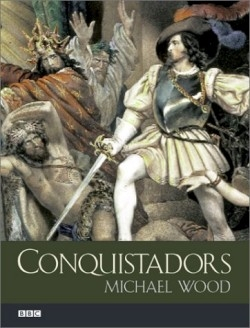Conquistadors
This impressively illustrated companion volume to a forthcoming TV series on the destruction of the Aztec and Inca civilizations and related explorations is necessarily one of high drama and telling contrasts. It is also broad-based and balanced, a powerful corrective to the false glamour so often built around Cortes, Pizarro and their colleagues in genocide. Militant Christianity and self-congratulatory European civilization live with a painful fact. In the New World their representatives encountered cities and peoples “never heard of, never seen, and never dreamed of before,” and made a highly effective effort to destroy them—cities, population, religion, culture, and art. “But of all these wonders I then beheld, today all is overthrown and lost, and nothing is left standing.” In writing of Mexico City (Tenochtitlan), Bernal DÃaz del Castillo also characterized a continent and its major civilizations.
Throughout his clean-cut account of the conquests Wood adds incisive analyses of Cortes’ and Pizarro’s social, psychological, and religious drives. He draws directly on the letters they and their colleague artfully wrote to their master, Charles V of Spain. The conquistadors considered the gold-rich Aztecs and Incas as undeserving of any human rights: their institutionalized government, codes of justice, and social welfare provisions counted for nothing. They were heathens; all measures against them were justified. Wood also cites the heart-rending Aztec and Inca histories, filled with overwhelming despair in recognizing that the Spaniards’ insatiable hunger for gold fueled betrayal, torture, and murder. The juxtaposing of these accounts illuminates such concepts as the shock of the new, the Other, and the power of religious belief.
Orellana’s two-year voyage from Quito, down the Amazon and on to Trinidad and Cabeza de Vaca’s trek from near modern-day Galveston to Mexico City (arriving eight years later) reflect a totally reversed situation: the Spaniards as dependents, not conquerors. Both men were pro-Indian and their accounts of journeys are essential other-view reading, as is Las Casas in his great debate with Sepulveda on the humanity of the Indians.
Wood does readers a major service in quoting the deathbed apologia sent by Mansio Serra de Leguizamon, “Last of the Conquistadors,” to Philip II. This conscience-stabbing realization of irreparable evil done will prompt many readers to re-examine the terrible tragedy of the Conquest of the New World, for which the bibliography lists key books, including Indian narratives, in accessible modern translations.
Reviewed by
Peter Skinner
Disclosure: This article is not an endorsement, but a review. The publisher of this book provided free copies of the book to have their book reviewed by a professional reviewer. No fee was paid by the publisher for this review. Foreword Reviews only recommends books that we love. Foreword Magazine, Inc. is disclosing this in accordance with the Federal Trade Commission’s 16 CFR, Part 255.

